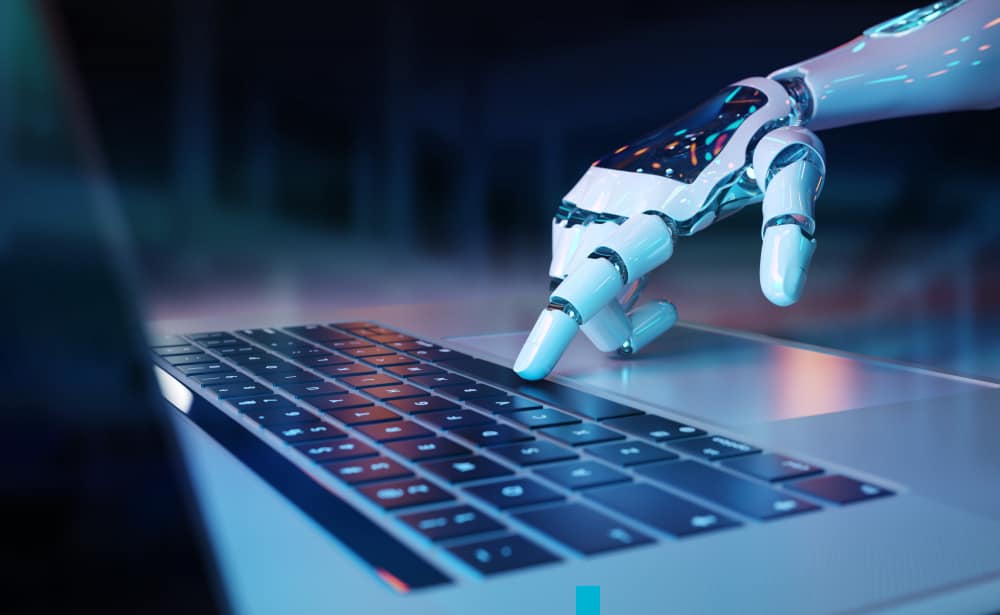In today’s rapidly evolving job market, finding the right talent has become more challenging than ever. Traditional recruitment methods often fall short in efficiently screening and identifying candidates who possess the desired skills and qualities. However, the emergence of generative artificial intelligence (AI) has opened up a world of possibilities for revolutionizing the recruitment process.
Generative AI, powered by advanced machine learning algorithms, has the ability to generate human-like text, images, and even conversations. This breakthrough technology is now being leveraged in the field of recruitment, transforming the way organizations attract, assess, and hire candidates.
By harnessing the capabilities of generative AI, recruiters can create highly engaging and personalized job descriptions that capture the attention of potential candidates. These AI-generated job descriptions are not only appealing but also optimized for specific online platforms and search engines, ensuring maximum visibility to the target audience.

Moreover, generative AI can assist in the creation of realistic and interactive simulations for skill assessments. Candidates can now demonstrate their abilities in simulated work environments, allowing recruiters to evaluate their performance and compatibility with the job requirements more accurately. This eliminates the need for traditional, time-consuming assessment methods and provides a more efficient and objective evaluation process.
In addition to transforming the initial stages of recruitment, generative AI can also streamline the interview process. AI-powered chatbots can conduct automated interviews, interacting with candidates through natural language processing. These chatbots can evaluate candidates’ responses, assess their soft skills, and provide real-time feedback, saving valuable time for recruiters and enhancing the overall candidate experience.
The potential of generative AI in recruitment is vast and promises to unlock new possibilities in identifying and securing top talent. By leveraging this technology, organizations can overcome traditional recruitment challenges, enhance the efficiency of their hiring processes, and ultimately build stronger, more capable teams to thrive in the dynamic business landscape.
Table of Contents
ToggleHow AI Powered Recruitment Is Changing the Recruitment Landscape?
AI Powered Recruitment is dramatically transforming the recruitment landscape, revolutionizing how organizations find, attract, and hire top talent. This cutting-edge technology is reshaping every stage of the recruitment process, from sourcing candidates to onboarding. Here’s how AI is changing the recruitment landscape:
- Efficient Candidate Sourcing: AI algorithms can swiftly scan through vast databases and online platforms to identify potential candidates that match specific criteria, saving recruiters significant time and effort. By leveraging AI, recruiters can access a larger pool of qualified candidates and ensure a more diverse and inclusive candidate selection.
- Intelligent Resume Screening: AI-powered systems can analyze resumes and applications, automatically extracting relevant information and comparing it with job requirements. This eliminates the manual effort of screening and shortlisting candidates, enabling recruiters to focus on more strategic tasks.
- Enhanced Candidate Engagement: AI chatbots and virtual assistants can engage with candidates, answer their queries, and provide personalized information about the organization and job opportunities. This improves candidate experience, increases engagement, and strengthens the employer brand.
- Data-Driven Decision Making: AI algorithms can analyze vast amounts of candidate data, uncovering patterns and insights that aid recruiters in making more informed hiring decisions. These insights can help identify the most suitable candidates, predict their performance, and improve overall recruitment strategies.
- Streamlined Interviews: AI-powered interview tools, such as video interviewing platforms, can assess candidates remotely, saving time and costs associated with scheduling and conducting in-person interviews. AI can also analyze facial expressions, tone of voice, and word choice to provide insights into a candidate’s personality and suitability for the role.
- Bias Reduction: By minimizing human involvement in the early stages of recruitment, AI can help reduce unconscious bias in the hiring process. AI algorithms can focus solely on candidate qualifications and skills, ensuring fairer and more objective evaluations.
AI-powered recruitment is significantly enhancing the efficiency, accuracy, and inclusivity of the hiring process. It enables organizations to identify the right candidates faster, make data-driven decisions, and ultimately build stronger teams that drive business success in the evolving job market.
Hirebee Makes finding the right people for your team much simpler with features like candidate screening and candidate sourcing.
How Generative AI in Recruitment Can Unlock New Possibilities
Helps with Collaboration Between AI and Humans
Generative AI in hiring facilitates effective collaboration between AI and humans, revolutionizing the recruitment process and maximizing its outcomes. By leveraging generative AI technology, organizations can harness the strengths of both AI and human expertise to make informed decisions and build successful teams.

Here’s how generative AI enables collaboration in hiring:
- AI-Generated Insights: Generative AI algorithms can analyze vast amounts of data to provide valuable insights and recommendations to human recruiters. These insights can include patterns in candidate profiles, skills gaps in the organization, or even predictions on candidate performance. By combining the analytical capabilities of AI with human expertise, recruiters can make more informed decisions and enhance the quality of their hiring choices.
- Human Oversight and Decision-Making: While AI algorithms can perform initial screening and assessments, the final decision-making power lies with humans. Generative AI in hiring acts as a valuable assistant, helping human recruiters streamline their workflows, save time, and focus on critical tasks that require human intuition, such as evaluating cultural fit or assessing soft skills that AI may struggle to analyze accurately.
- Refinement and Continuous Improvement: Generative AI can learn from human feedback and outcomes to continuously improve its performance in the recruitment process. Human recruiters can provide feedback on AI-generated job descriptions, assessments, or interview questions, enabling the AI system to refine its algorithms and generate more accurate and effective content in the future.
- Ethical and Inclusive Practices: Collaboration between AI and humans in hiring ensures ethical practices are upheld. Human oversight helps prevent biases and ensures fairness in decision-making. Human recruiters can identify any potential biases in the AI system and intervene to correct them, leading to more inclusive hiring practices.
By combining the strengths of generative AI and human recruiters, organizations can benefit from increased efficiency, reduced bias, and improved decision-making in the hiring process. This collaborative approach empowers organizations to make well-informed recruitment decisions and build diverse, talented teams that drive success in the ever-evolving business landscape.
Validate and Test AI Generated Content
Generative AI has opened up new possibilities in hiring by allowing recruiters to validate and test AI-generated content for candidate selection. As generative AI technologies become more sophisticated, they can generate a wide range of content, including resumes, cover letters, and responses to interview questions. However, it is crucial to ensure the accuracy, authenticity, and relevance of such AI-generated content before making important hiring decisions.
To validate and test AI-generated content, recruiters can employ various strategies. First, they can compare the AI-generated content with existing templates and samples to identify any inconsistencies, errors, or discrepancies. Recruiters can also use natural language processing (NLP) techniques to analyze the coherence, grammar, and tone of the generated content to determine its quality and appropriateness. NLP can help identify potential biases or discriminatory language that should be addressed.
Additionally, recruiters can utilize human-in-the-loop approaches, where AI-generated content is reviewed and verified by human experts. This collaborative process ensures that the AI-generated content aligns with the organization’s values, accurately represents the candidate’s qualifications and experiences, and adheres to ethical guidelines.
Furthermore, feedback loops can be established to continuously improve the AI models generating the content. By collecting feedback from recruiters and incorporating it into the training data, the AI models can learn and refine their content generation capabilities over time.
Validating and testing AI-generated content for candidate selection ensures that the information presented accurately reflects candidates’ skills, experiences, and qualifications. This approach maintains the integrity and reliability of the recruitment process while leveraging the benefits of generative AI technologies to streamline and enhance candidate selection.
Leave Time Consuming Tasks to Generative AI
Generative AI in hiring empowers organizations to delegate time-consuming tasks to advanced machine learning algorithms, freeing up valuable time and resources for recruiters to focus on strategic and high-value activities.

Here’s how generative AI streamlines the hiring process:
- Job Description Generation: Crafting compelling and tailored job descriptions can be a time-consuming task. Generative AI can generate engaging and customized job descriptions that attract the right candidates. By leveraging AI, recruiters can save time while ensuring that job descriptions are optimized for specific platforms and targeted towards the desired audience.
- Automated Resume Screening: Reviewing a large volume of resumes and applications is a tedious and labor-intensive process. Generative AI algorithms can automatically screen and analyze resumes, extracting key information and matching it with job requirements. This significantly speeds up the screening process, allowing recruiters to focus on evaluating the most qualified candidates.
- Simulated Skill Assessments: Traditional skill assessments often require significant time and resources. Generative AI enables the creation of interactive simulations that replicate real work scenarios. Candidates can showcase their abilities in these simulations, providing recruiters with a more accurate assessment of their skills and performance. This eliminates the need for manual evaluation and expedites the screening process.
- AI-powered Interviewing: Generative AI facilitates automated interviews through chatbots or virtual assistants. These AI-powered systems can conduct interviews, ask predefined questions, and evaluate candidate responses. This not only saves time but also ensures consistency and objectivity in the interviewing process.
- Candidate Engagement and Feedback: Generative AI can engage with candidates through automated messaging systems, answering their queries and providing timely updates. Additionally, AI algorithms can provide real-time feedback to candidates, enhancing their overall experience and reducing the manual effort required from recruiters.
By leveraging generative AI in hiring, organizations can optimize their recruitment processes, save time, and improve efficiency. This technology enables recruiters to focus on building meaningful relationships with candidates, evaluating their fit within the organization, and making informed hiring decisions that drive business success.
Understand the Limitations and Capabilities of Generative AI
Generative AI, with its ability to generate human-like text, images, and conversations, has gained traction in various fields, including hiring and recruitment. However, it is essential to understand both the limitations and capabilities of generative AI when applying it to the hiring process.
One of the limitations of generative AI is the potential for bias. AI models are trained on large datasets, which may inadvertently contain biases present in the data. This can result in biased job descriptions or assessments generated by the AI system, leading to unintended discrimination. It is crucial to carefully review and mitigate these biases to ensure fair and inclusive hiring practices.
Another limitation is the lack of context comprehension. While generative AI can produce impressive outputs, it may not always understand the nuances of specific industries, roles, or organizations. Contextual understanding is crucial for accurately assessing candidate qualifications and fit. Human oversight and intervention are necessary to ensure that AI-generated content aligns with the organization’s requirements and culture.
On the other hand, generative AI offers several capabilities that can greatly benefit the hiring process. It can automate repetitive tasks, such as resume screening and initial candidate engagement, saving valuable time for recruiters. AI-powered chatbots can handle candidate queries, provide information, and streamline communication, enhancing the candidate experience.
Generative AI can also assist in creating realistic simulations for skill assessments. Candidates can demonstrate their abilities in simulated work environments, allowing recruiters to evaluate their performance more accurately. This capability provides a more objective and standardized assessment process, enabling fairer comparisons between candidates.
While generative AI brings significant advantages to the hiring process, it is crucial to strike a balance between leveraging its capabilities and ensuring human oversight to mitigate limitations and potential biases. Combining the strengths of generative AI with human judgment and expertise can result in a more effective and inclusive hiring process that unlocks the full potential of this transformative technology.
Can Help with More Diverse Candidate Selection
Generative AI in hiring is proving to be a valuable tool in promoting and facilitating more diverse candidate selection. Traditional recruitment methods often inadvertently perpetuate biases and result in a lack of diversity within organizations. However, generative AI has the potential to mitigate these biases and foster a more inclusive hiring process.

Here’s how generative AI can help with more diverse candidate selection:
- Unbiased Screening: Generative AI algorithms can evaluate candidate qualifications based on objective criteria, such as skills and experience, without being influenced by factors like gender, ethnicity, or background. By removing human biases, AI-powered screening ensures that candidates are assessed solely on their merit, increasing the chances of diverse candidates advancing in the selection process.
- Language Optimization: Generative AI can assist in crafting job descriptions and recruitment materials that are inclusive and appeal to a broader audience. AI algorithms can identify and remove language biases, such as gendered or exclusive terminology, ensuring that job advertisements resonate with diverse candidates and attract a more varied pool of applicants.
- Skills Assessment: Generative AI enables the creation of skill assessments that are blind to demographic information. Candidates can demonstrate their abilities through simulations or anonymized coding challenges, ensuring that their skills are the primary factor considered in the evaluation process. This helps overcome potential biases associated with traditional assessments and opens the door to a more diverse talent pool.
- Data-Driven Decision Making: Generative AI can analyze large sets of candidate data to identify patterns and trends related to diversity and inclusion. This data-driven approach can highlight any potential biases in the hiring process and guide recruiters in making more inclusive decisions. By examining objective metrics, such as hiring ratios across different demographics, organizations can take proactive steps to address any imbalances and promote diversity.
By leveraging generative AI in the hiring process, organizations can move towards a more diverse and inclusive workforce. It enables fairer evaluations, reduces unconscious biases, and ensures that qualified candidates from underrepresented groups have equal opportunities to showcase their skills and contribute to the success of the organization.
Conclusion
Generative AI is revolutionizing the recruitment landscape by unlocking new possibilities for attracting and hiring top talent. Through AI-generated job descriptions, personalized candidate engagement, and advanced assessment simulations, organizations can streamline and optimize their recruitment processes. Generative AI enables unbiased screening, promotes diverse candidate selection, and empowers data-driven decision making. By harnessing the capabilities of this technology, organizations can overcome traditional recruitment challenges, enhance efficiency, and build stronger, more diverse teams. As generative AI continues to evolve, it holds the promise of transforming the future of recruitment and empowering organizations to thrive in an ever-changing job market.
Hirebee allows you to find the right individuals for your team, especially thanks to improved recruitment automation features and job distributions services.
FAQs
How are Companies Using Generative AI?
Companies are using generative AI for various purposes, such as creating personalized marketing content, generating realistic simulations for training and development, automating customer service through chatbots, optimizing supply chain management, and enhancing recruitment processes by creating engaging job descriptions and conducting automated interviews.
How can Generative AI Help with Candidate Selection?
Generative AI can assist with candidate selection by providing unbiased screening based on objective criteria, optimizing job descriptions to attract a diverse pool of applicants, and creating simulations for skills assessments that evaluate candidates solely on their abilities, promoting fair and inclusive evaluations.
Is Generative AI Free?
Generative AI technologies are not typically free. They involve complex algorithms, infrastructure, and computational resources, which often require investment. Companies offering generative AI solutions may have different pricing models, including subscription plans, usage-based fees, or licensing agreements.
What are Some Popular Uses for Generative AI?
Some popular uses for generative AI include generating realistic images, creating conversational chatbots, generating text for content creation, enhancing virtual reality experiences, and assisting in creative tasks such as art and music generation.









